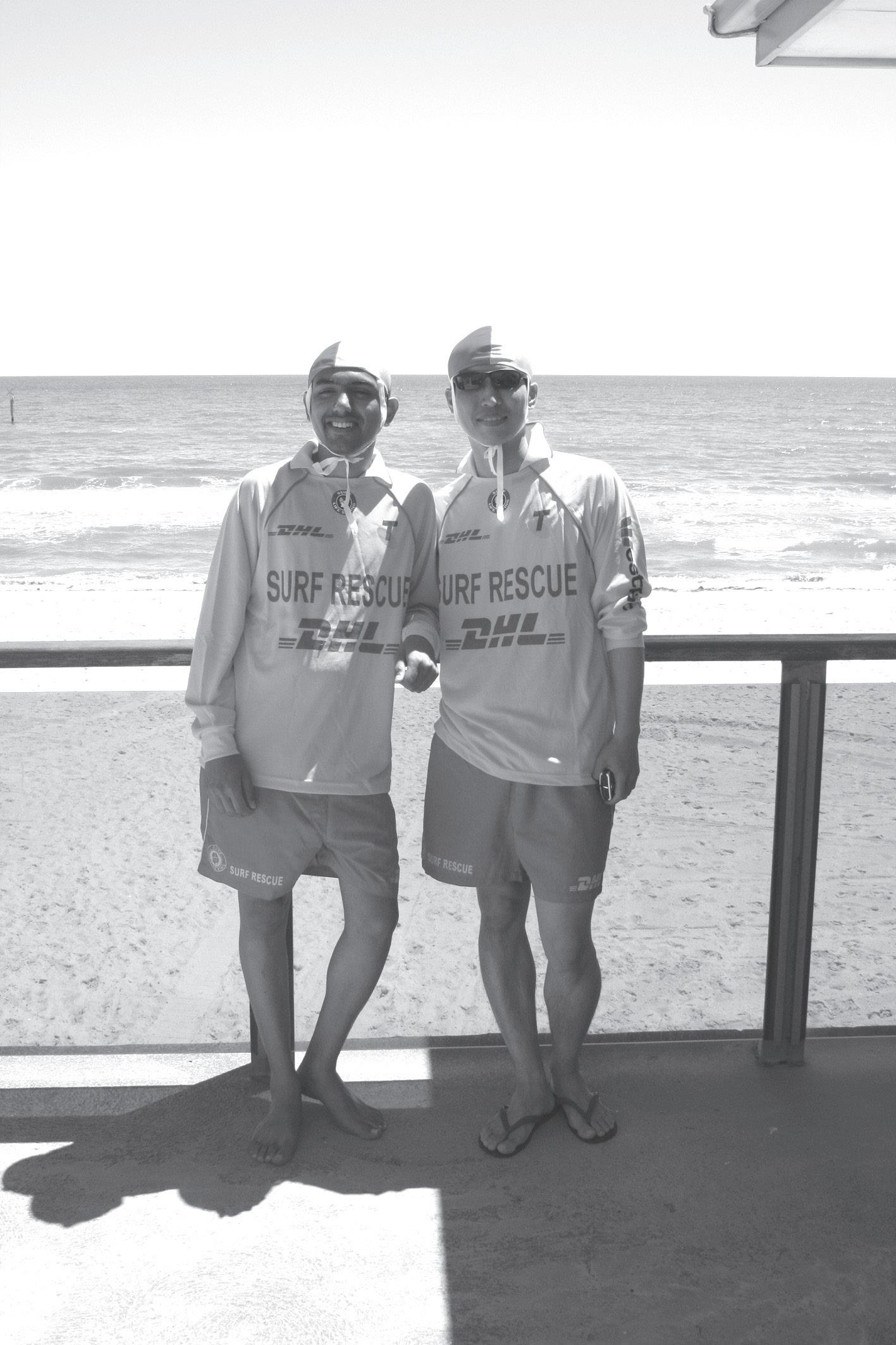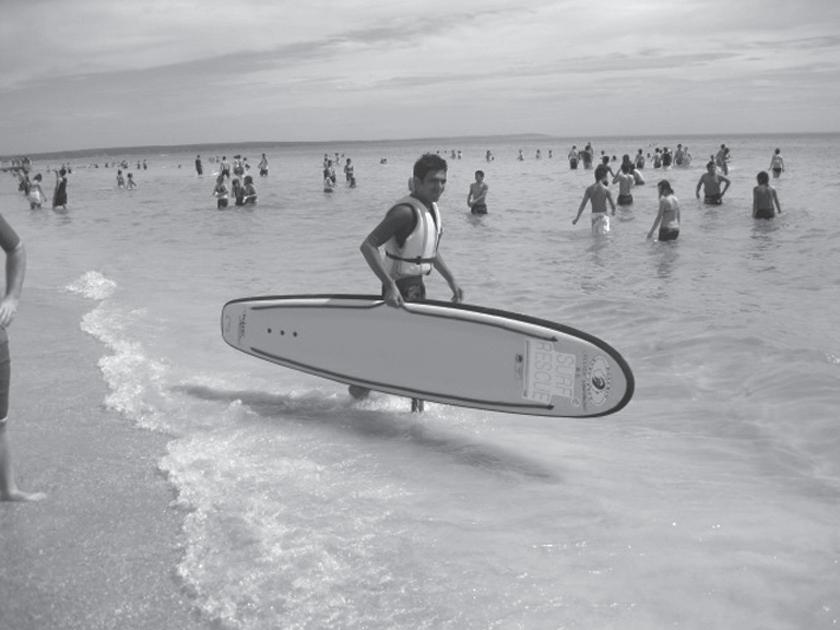
5 minute read
Beach boy
from 2010-02 Melbourne
by Indian Link
VISHAL KUKAL talks about making friends and influencing people as a volunteer lifesaver on Victoria’s beaches
How it all began…
A few months ago, I visited a stall run by Life Saving Victoria, who were looking for volunteers to join their team of lifesavers patrolling the beaches of the state. Their dedication and devotion impressed me, and I asked if I could join the team, although I didn’t even know how to swim well. They accepted my request, and after three weeks of swimming classes and five days of intensive coaching in the duties of a lifesaver, I was ready to take on the beach.
How to be a lifesaver…
There are a lot of things I learned. Apart from the obvious ones like patrolling, offering first aid and educating people about water safety, I also learned about rescue operations, rules and regulations, sea levels, even how to recognise safe and unsafe areas to swim. For example, if there has been a shark sighting, we follow certain evacuation procedures. If a person has been stung by a jellyfish, we need to put ice on the affected area to reduce the sting which can be very painful. The entire course was very interesting and informative, and I am glad that I took the initiative to be a lifesaver.
Currently my job involves….
Patrolling mainly, first aid when needed, and talking to people about water safety. I am a part of the Chelsea Long Beach Life Saving Club and I have now learned all about the beach, its safe and dangerous spots, and how to steer tourists and visitors to stay within the flags which mark safe spots. I constantly scan the beach through binoculars for signs of any distress or unusual incidents and we then take action. Very often students tend to be a little adventurous and it is my job to make sure they are cautious, to avoid accidents. Of course, I am still new at the job and have not had any major crisis or life-saving opportunities, but I am sure a few will come my way.
I enjoy being a volunteer lifesaver because…
Apart from being able to offer voluntary backgrounds, cultures and countries, of different ages and attitudes – it has helped a lot in understanding and appreciating people. The beach I patrol is a popular tourist destination as well, so we get a mix of all kinds of people. But because it is rare to see Indian lifesavers, a lot of sub-continent visitors come over for a chat and are curious about what I do. So in addition to educating them about water safety, I also get a chance to talk to and meet different kinds of people. Some are regular visitors on the beach, so they recognise me and come over to say hello. It’s a good feeling and I enjoy being a part of the team.
How the job helps me
It keeps me fit and active, and of course, I am happy to contribute to society. I am a student presently, studying accounting and finance, so I don’t have much time on hand. But whatever little time I can spare, specially on Sundays, I go down to the beach to take on my lifesaver duties. I have also found that being a lifesaver is a great way to get to know the Aussies and their lifestyle and culture. They are all friendly and helpful, and I have learned a lot through interaction with them.
About myself…
I am originally from New Delhi, where I studied and worked as an accountant. I have a history of social work, and was also actively involved in a Delhi University project on a smoke-free initiative. My job then was to talk to students and adults on the merits of being smoke-free, and this too was voluntary service. I enjoy helping others and making a positive contribution to society. I am also a member of the Rootvij Kakadia Foundation which aims to educate people about water safety.
My message…
I enjoy being a lifesaver, and with the right kind of training and a positive attitude, anyone can volunteer. But for me it’s not just that, because I try and spread the message that being a lifesaver is a responsible, yet fun job. In fact, I have convinced some of my friends to join the service too, and they are keen on starting the training. Connecting with people is important, and my voluntary job as a lifesaver has helped me make friends as well as help society.
Vishal spoke with Sheryl Dixit
Life-saving foundation in memory of drown victim
Rising temperatures + summer heat = time to head for the beach.
While it is great fun to be in the sun, it is essential to add beach safety to this equation. Australia is blessed with one of the most beautiful coastlines and pristine beaches. Beach culture is prevalent in Australia especially around this time of the year.
Unfortunately however many new migrants are not au fait with water and swimming education that is crucial to their safety. This has resulted in a disproportionate number of drowning and water-related injuries among the migrant communities in Australia. It has been noted statistically that the majority of harmful incidents and fatalities that occur at Australian beaches involve recentlyarrived Australians and other nationalities. These could be tourists, migrants or international students.
‘Read the Beach’ is an exciting new campaign being promoted by Melbourne’s Rootvij Kakadia Foundation (RKF) to raise beach safety awareness amongst the migrant community in Australia.

The foundation was formed last year in memory of young Rootvij Kakadia who drowned in Lake Tyers beach near Lakes Entrance in Victoria while attempting to save a friend. 26-year-old Rootvij was a popular young man who made the ultimate sacrifice while trying to help someone in need. Inspired by his selfless act, his family and friends decided to establish a forum to help educate people about various aspects of water safety.
A beach program was organised by RKF, recently, at Chelsea beach in Melbourne. It was attended by international students from Box Hill TAFE. The session was held in association with Life Saving Victoria (LSV). RKF funded 50% of the cost of conducting the session. This was the first time such a large multicultural group participated in a Beach Program conducted by LSV.
LSV is an organisation that has been imparting water safety education through its various courses and initiatives. Its mission is to prevent aquatic-related death and injury in all Victorian communities.
LSV’s vision is that all Victorians will learn water safety, swimming and resuscitation, and be provided with safe aquatic environments and venues. Rootvij’s brother Mounil Kadakia, who was instrumental in setting up the Foundation, said, “We think that the time is right for the Indian community to know about our Foundation. We are a small group, but we have very high aims and we definitely need a lot of support from the community”.
The RKF Foundation has more than 50 members mainly from the Indian community. Some of the key members of RKF include Kalpana, Manoj, Mounil and Radha Kadakia along with Dr Chandra Bhuta, Ravi Lakhani, Upendra Shah and Tejas Patel.










